北师大版(2019)选择性必修第二册Unit5 Education Topic Talk 课件(共29张PPT)
文档属性
| 名称 | 北师大版(2019)选择性必修第二册Unit5 Education Topic Talk 课件(共29张PPT) | 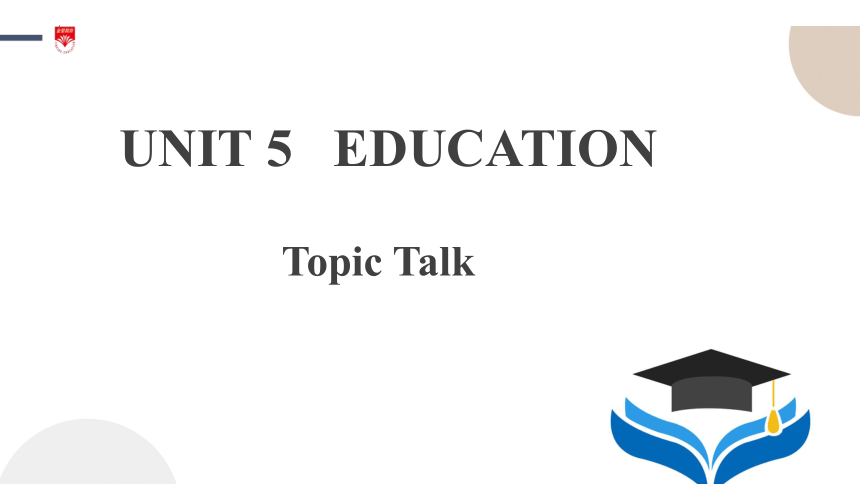 | |
| 格式 | pptx | ||
| 文件大小 | 9.5MB | ||
| 资源类型 | 教案 | ||
| 版本资源 | 北师大版(2019) | ||
| 科目 | 英语 | ||
| 更新时间 | 2024-04-15 21:03:09 | ||
图片预览


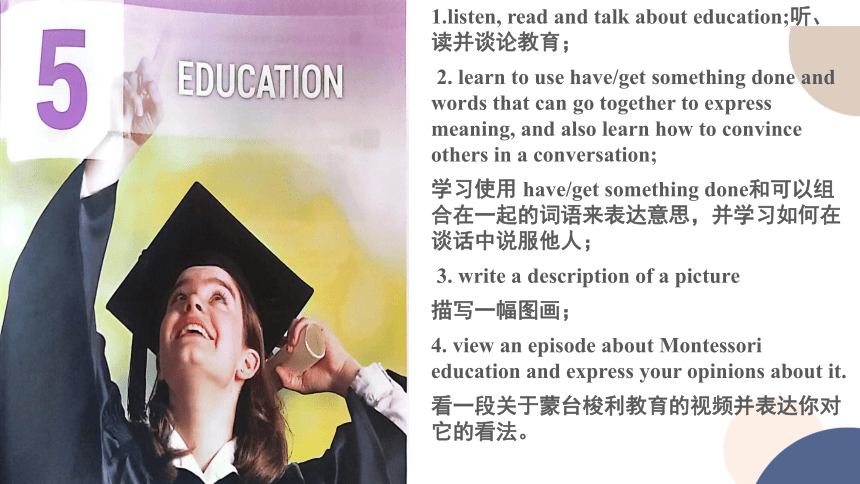
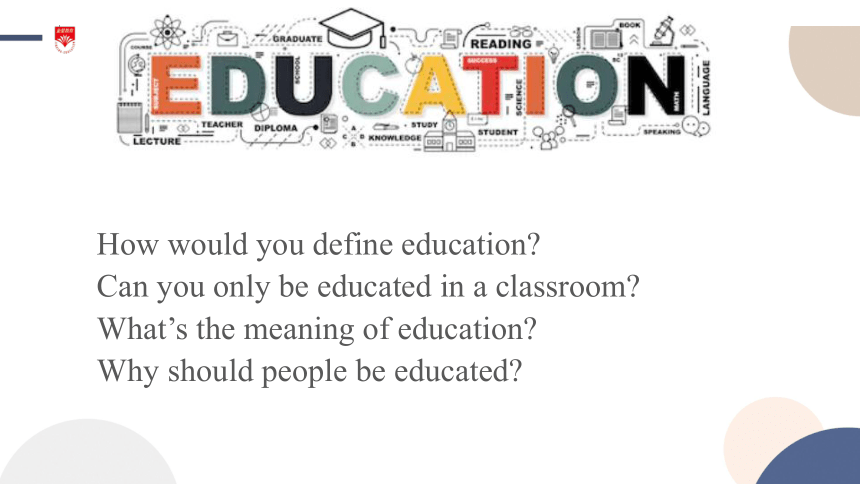

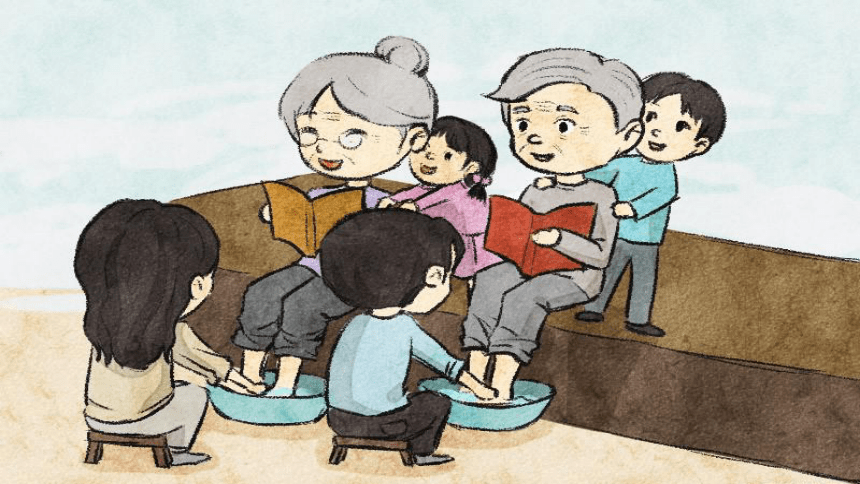
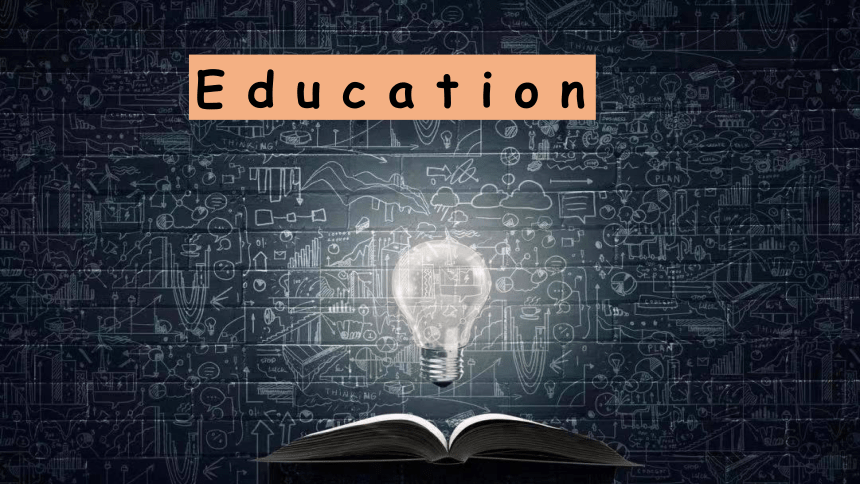
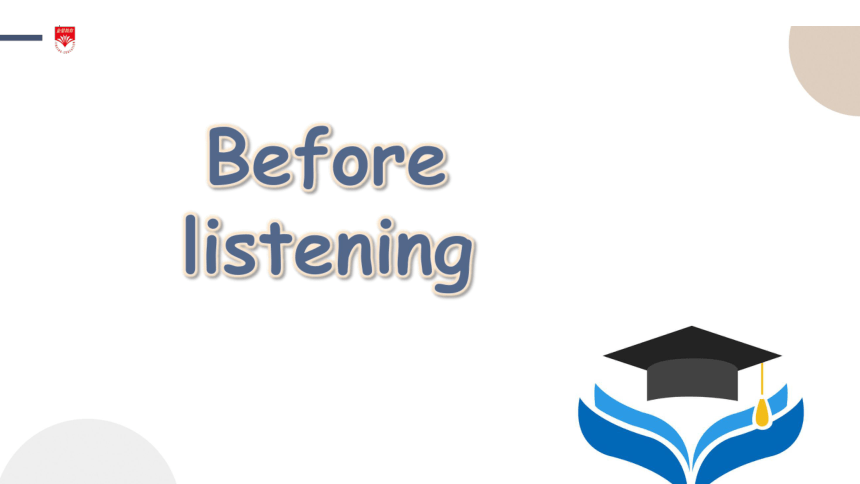

文档简介
(共29张PPT)
UNIT 5 EDUCATION
Topic Talk
1.listen, read and talk about education;听、读并谈论教育;
2. learn to use have/get something done and words that can go together to express meaning, and also learn how to convince others in a conversation;
学习使用 have/get something done和可以组合在一起的词语来表达意思,并学习如何在谈话中说服他人;
3. write a description of a picture
描写一幅图画;
4. view an episode about Montessori education and express your opinions about it.
看一段关于蒙台梭利教育的视频并表达你对它的看法。
How would you define education
Can you only be educated in a classroom
What’s the meaning of education
Why should people be educated
E d u c a t i o n
Before
listening
Topic talk
1.significance 2.promote 3.facilitate 4.consistent 5.cultivate
6.sympathy 7.fellow man 8.analyse 9.philosopher
10.educator 11.insist 12.evaluate
Topic talk
1.重要性 2.促进 3.促进使便利 4.一贯的一致的 5.培养
6.同情心 7.人类 8.分析 9.哲学家 10.教育工作者
11.坚持主张 12.评估
I. 单词拼写
1. Structured teaching _______________(促进) learning.
2. I have no _________________(同情) for Jan; it's all her own fault.
3. He was also an economist and political ___________________(哲学家).
4. We must be __________________(一致的) in applying the rules.
5. We need to _________________(评估) how well the policy is working.
II. 单句语法填空
1. The new drug has great________________(significant) for the treatment of the disease.
2. The new job is a ________________(promote) for him.
3. The job involves gathering and _______________( analyse) data.
4. That__________________(educate) published many articles in these magazines.
5. She insisted________________ his/him wearing a suit.
facilitates
sympathy
philosopher
consistent
evaluate
significance
promotion
analysing
educator
on
While
listening
Listen and finish the tasks
as quickly as possible.
(I=Interviewer W=Professor Wilson)
1: Hello, Professor Wilson, and thank you for joining us today. Would you please tell us
something about education
W: Sure. __________________________________________________; thus, philosophers and
educators have devoted a good deal of time to ______________(explore) its meaning.
I: So, what are some of their thoughts
W: Well, for example, the first great educational philosopher of modern enius,
insisted that when teaching, the subject matter should ____________________learners'
interests, and the method of instruction should be consistent with their mental
development.
I: That's very true. It's important to make education match the learners' interests and _______________________
W: Yes. Another world-famous philosopher and educator, John Dewey, said that "education
is not preparation for life; education is life itself."
Education has great social and personal significance
exploring
be adapted to
meet their needs.
1: What does that mean exactly Could you explain, please
W: Well, I think it means that education is not simply about ______________________________________ necessary for a future life, but to _______________________experience of living while learning to use
that knowledge and those skills _______________real-world problems.
I: Indeed, education and society should ____________________.
W: Yes. Nowadays, education stresses more on ____________________________, exploring
the truth and developing ____________________________________of our fellow men.
1: Thank you, Professor Wilson.
passing on knowledge and skills
provide a rich
to solve
be closely connected
cultivating creative minds
sympathy for and understanding
Discussion
Significance
Education has great social and personal significance.
Meaning
When teaching, the subject matter should be adapted to learners’ interest,
and the method of instruction should be consistent with their mental development.
Education is life itself.
Aims
Education stresses more on cultivating creative minds, exploring the truth and developing sympathy for and understanding of our fellow men.
Listen to the dialogue and complete it by underlining the expressions you hear.
Text Builder
Listening
Listening
We remember ____ of what we ____.
hear 10%
read
see
see and hear
discuss with others
do
teach to others
Look at the table and the diagram. What do you expect to hear
(Y=Yang Ping J=Jason)
Y: I've been looking at ways we learn. I saw a diagram on the Internet the other day.It
showed that we remember ten percent of what we hear. We remember twenty percent of
what we read, thirty percent of what we see, fifty percent of what we see and hear, seventy
percent of what we discuss with others, eighty percent of what we do and ninety-five
percent of what we teach to others.
J: Wow, that is interesting! It ties in with what I've been told, that if you want to be sure you
understand something then try and teach it to someone else. If you can't explain it, then
you don't understand it clearly yourself.
Y: That is true. Remember what our teacher told us the other day about how we learn
J: Yes, actually I do! It goes in this order. first we remember, then we understand.then we
apply what we have learnt. After that we analyse and evaluate what happened and then
create something new from what we have learnt.
Y: Exactly! Let's give it a try!
How We Learn
Listening
reate
valuate
pply
emember
After
listening
analysing, retelling
My understanding of education
Conclusion
mental development
1
2
basic skills for a future life
3
creative minds
4
create something new
education
Educating the mind without educating the heart is no education at all.
—Aristotle
只重视头脑教育而不重视心灵教育,不足以称之教育。
Use the language you have learnt to write a short paragraph
about your school education and how to learn better.
Education is not preparation for life;education is life itself. Through education,students gain knowledge and skills necessary for the future life. Actually education and society should be closely connected. To study better,students need to remember, understand and apply what has been learned. They analyse and evaluate what happened and then create something new. The most effective way to study better is to teach what you have learned to others.
UNIT 5 EDUCATION
Topic Talk
1.listen, read and talk about education;听、读并谈论教育;
2. learn to use have/get something done and words that can go together to express meaning, and also learn how to convince others in a conversation;
学习使用 have/get something done和可以组合在一起的词语来表达意思,并学习如何在谈话中说服他人;
3. write a description of a picture
描写一幅图画;
4. view an episode about Montessori education and express your opinions about it.
看一段关于蒙台梭利教育的视频并表达你对它的看法。
How would you define education
Can you only be educated in a classroom
What’s the meaning of education
Why should people be educated
E d u c a t i o n
Before
listening
Topic talk
1.significance 2.promote 3.facilitate 4.consistent 5.cultivate
6.sympathy 7.fellow man 8.analyse 9.philosopher
10.educator 11.insist 12.evaluate
Topic talk
1.重要性 2.促进 3.促进使便利 4.一贯的一致的 5.培养
6.同情心 7.人类 8.分析 9.哲学家 10.教育工作者
11.坚持主张 12.评估
I. 单词拼写
1. Structured teaching _______________(促进) learning.
2. I have no _________________(同情) for Jan; it's all her own fault.
3. He was also an economist and political ___________________(哲学家).
4. We must be __________________(一致的) in applying the rules.
5. We need to _________________(评估) how well the policy is working.
II. 单句语法填空
1. The new drug has great________________(significant) for the treatment of the disease.
2. The new job is a ________________(promote) for him.
3. The job involves gathering and _______________( analyse) data.
4. That__________________(educate) published many articles in these magazines.
5. She insisted________________ his/him wearing a suit.
facilitates
sympathy
philosopher
consistent
evaluate
significance
promotion
analysing
educator
on
While
listening
Listen and finish the tasks
as quickly as possible.
(I=Interviewer W=Professor Wilson)
1: Hello, Professor Wilson, and thank you for joining us today. Would you please tell us
something about education
W: Sure. __________________________________________________; thus, philosophers and
educators have devoted a good deal of time to ______________(explore) its meaning.
I: So, what are some of their thoughts
W: Well, for example, the first great educational philosopher of modern enius,
insisted that when teaching, the subject matter should ____________________learners'
interests, and the method of instruction should be consistent with their mental
development.
I: That's very true. It's important to make education match the learners' interests and _______________________
W: Yes. Another world-famous philosopher and educator, John Dewey, said that "education
is not preparation for life; education is life itself."
Education has great social and personal significance
exploring
be adapted to
meet their needs.
1: What does that mean exactly Could you explain, please
W: Well, I think it means that education is not simply about ______________________________________ necessary for a future life, but to _______________________experience of living while learning to use
that knowledge and those skills _______________real-world problems.
I: Indeed, education and society should ____________________.
W: Yes. Nowadays, education stresses more on ____________________________, exploring
the truth and developing ____________________________________of our fellow men.
1: Thank you, Professor Wilson.
passing on knowledge and skills
provide a rich
to solve
be closely connected
cultivating creative minds
sympathy for and understanding
Discussion
Significance
Education has great social and personal significance.
Meaning
When teaching, the subject matter should be adapted to learners’ interest,
and the method of instruction should be consistent with their mental development.
Education is life itself.
Aims
Education stresses more on cultivating creative minds, exploring the truth and developing sympathy for and understanding of our fellow men.
Listen to the dialogue and complete it by underlining the expressions you hear.
Text Builder
Listening
Listening
We remember ____ of what we ____.
hear 10%
read
see
see and hear
discuss with others
do
teach to others
Look at the table and the diagram. What do you expect to hear
(Y=Yang Ping J=Jason)
Y: I've been looking at ways we learn. I saw a diagram on the Internet the other day.It
showed that we remember ten percent of what we hear. We remember twenty percent of
what we read, thirty percent of what we see, fifty percent of what we see and hear, seventy
percent of what we discuss with others, eighty percent of what we do and ninety-five
percent of what we teach to others.
J: Wow, that is interesting! It ties in with what I've been told, that if you want to be sure you
understand something then try and teach it to someone else. If you can't explain it, then
you don't understand it clearly yourself.
Y: That is true. Remember what our teacher told us the other day about how we learn
J: Yes, actually I do! It goes in this order. first we remember, then we understand.then we
apply what we have learnt. After that we analyse and evaluate what happened and then
create something new from what we have learnt.
Y: Exactly! Let's give it a try!
How We Learn
Listening
reate
valuate
pply
emember
After
listening
analysing, retelling
My understanding of education
Conclusion
mental development
1
2
basic skills for a future life
3
creative minds
4
create something new
education
Educating the mind without educating the heart is no education at all.
—Aristotle
只重视头脑教育而不重视心灵教育,不足以称之教育。
Use the language you have learnt to write a short paragraph
about your school education and how to learn better.
Education is not preparation for life;education is life itself. Through education,students gain knowledge and skills necessary for the future life. Actually education and society should be closely connected. To study better,students need to remember, understand and apply what has been learned. They analyse and evaluate what happened and then create something new. The most effective way to study better is to teach what you have learned to others.
同课章节目录
- Unit 4 Humour
- Lesson 1 What’s So Funny?
- Lesson 2 Why Do We Need Humour?
- Lesson 3 My Favourite Comedian
- Unit 5 Education
- Lesson 1 Enlightening a Mind
- Lesson 2 The Objectives of Education
- Lesson 3 Understanding
- Unit 6 The Media
- Lesson 1 From Page to Screen
- Lesson 2 Questions about Media
- Lesson 3 The Advertising Game
